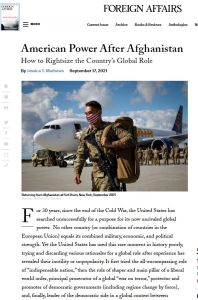Join getAbstract to access the summary!

Join getAbstract to access the summary!
Jessica T. Mathews
American Power After Afghanistan
How to Rightsize the Country’s Global Role
Foreign Affairs, 2021
What's inside?
Will America’s failure in Afghanistan prompt a rethinking of its muddled post-Cold War foreign policy?
Recommendation
The most powerful country in the world does not know what to do with its power, writes foreign policy expert Jessica T. Mathews in this lucid, concise essay on US international missteps since the end of the Cold War. She notes that America’s failure in Afghanistan is an opportunity for the United States to examine its history of failed interventions, and she offers some sound advice for a change of course. Anyone interested in geopolitical history and in current events will find this a worthwhile read, especially those wondering how America managed to lose the longest war in its history.
Summary
About the Author
Jessica T. Mathews is a distinguished fellow and the former president of the Carnegie Endowment for International Peace.


















Comment on this summary